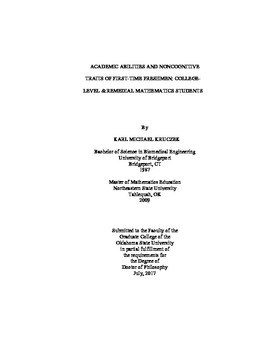| dc.contributor.advisor | Utley, Juliana | |
| dc.contributor.author | Kruczek, Karl Michael | |
| dc.date.accessioned | 2018-04-23T19:35:34Z | |
| dc.date.available | 2018-04-23T19:35:34Z | |
| dc.date.issued | 2017-07 | |
| dc.identifier.uri | https://hdl.handle.net/11244/299523 | |
| dc.description.abstract | First-time freshmen students enter college with varying levels of precollege academic success in mathematics, assorted demographic backgrounds, grit levels, metacognitive awareness, and mindsets (views on the malleability of intelligence). This study at a Midwestern regional university, first examined demographic, cognitive, and non-cognitive characteristics of 159 participants enrolled in three levels of mathematics courses: full-time remediation, part-time remediation (co-requisite college algebra), and college-level mathematics courses that required no remediation. A subgroup comparison on the variables was then conducted to gain an understanding of the differences between the three groups of mathematics students. Lastly, the study investigated variables that predicted academic achievement (final course grades), and retention. | |
| dc.description.abstract | University records provided placement test scores, high school GPA, and ACT scores, while an online self-report survey yielded demographic, grit, mindset, and metacognitive awareness data. Participant high school GPA and ACT scores mirrored state averages, though nearly 50% were enrolled in a mathematics course requiring remediation, which was higher than the 32.5% statewide figure. Demographic background results revealed that nearly three-fourths of the participants were female, nearly half were White, one-fourth Native American, and about 90% under 20 years of age. Non-cognitively, the participants had more of a growth mindset (M=4.40), above average levels of grit (M=3.40), and higher than average metacognitive awareness (M=183.4). | |
| dc.description.abstract | The study revealed differences among the three groups, including significantly higher percentages of full-time remediation students reported their father never attended college. Students' not needing remediation had significantly higher GPA's and ACT scores than the full-time and part-time mathematics remediation students. Full-time remediation students had significantly lower grit, metacognitive awareness, and final grade averages than the non-remediated students. | |
| dc.description.abstract | Hierarchical regression analysis determined grit and ethnicity predicted final grades for students in any remediation course, while grit and high school GPA predicted grades for the non-remediation students. Logistic regression revealed the odds that mathematics remediation students returning (retention) increased as placement test scores and metacognitive awareness increased. Understanding all three characteristics (demographic, precollege cognitive, and non-cognitive) are important because having a deeper knowledge of the students, may help educators provide interventions and opportunities that enable all mathematics students to succeed. | |
| dc.format | application/pdf | |
| dc.language | en_US | |
| dc.rights | Copyright is held by the author who has granted the Oklahoma State University Library the non-exclusive right to share this material in its institutional repository. Contact Digital Library Services at lib-dls@okstate.edu or 405-744-9161 for the permission policy on the use, reproduction or distribution of this material. | |
| dc.title | Academic abilities and noncognitive traits of first-time freshmen: College-level and remedial mathematics students | |
| dc.contributor.committeeMember | Ivey, Toni | |
| dc.contributor.committeeMember | Redmond-Sanogo, Adrienne | |
| dc.contributor.committeeMember | Stansberry, Susan | |
| osu.filename | Kruczek_okstate_0664D_15287.pdf | |
| osu.accesstype | Open Access | |
| dc.type.genre | Dissertation | |
| dc.type.material | Text | |
| thesis.degree.discipline | Education | |
| thesis.degree.grantor | Oklahoma State University | |
